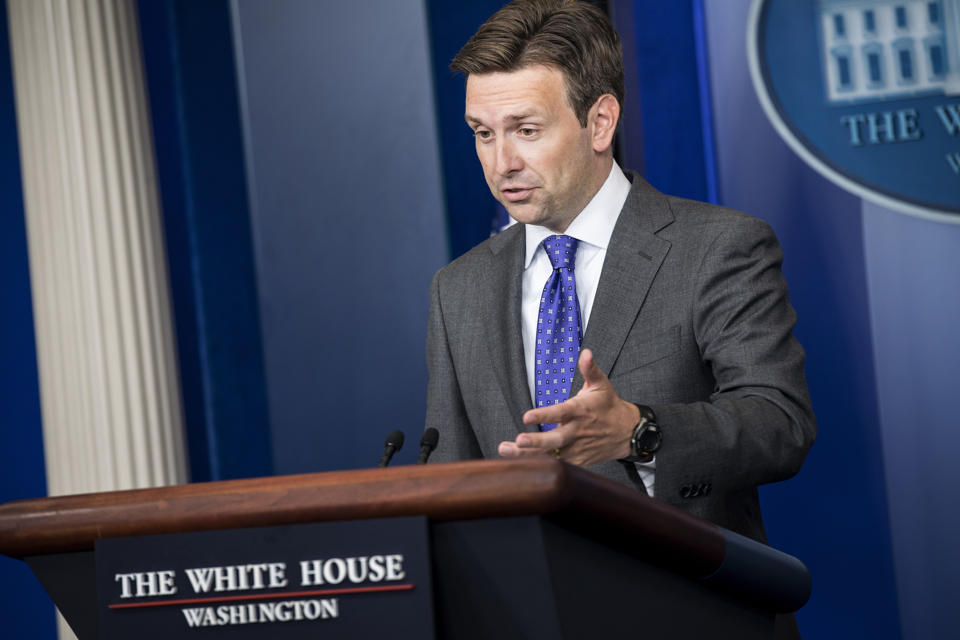The United States tried to cool Monday a new spy row with Germany after Chancellor Angela Merkel warned reports an alleged German double agent helped the CIA could again damage trust between the allies.
Revelations that a 31-year-old German intelligence operative was suspected of espionage revived suspicion between Berlin and Washington which had barely ebbed following reports last year the US National Security Agency (NSA) tapped Merkel's cellphone.
Merkel, who was furious over the previous US-Germany espionage row sparked by fugitive leaker Edward Snowden's revelations, said during a visit to Beijing that if the reports were correct, "it would be a serious case."
"It would be for me a clear contradiction as to what I consider to be trusting cooperation between agencies and partners."
Washington, in line with normal practice on espionage issues, declined to comment on the report.
But it launched a new effort to prevent the alleged incident again tarnishing ties with Germany. America's image has already taken a big hit in a country where the heavy hand of state snooping is a fresh memory.
'Incredibly important'
"We are going to work with the Germans to resolve this situation appropriately," said White House spokesman Josh Earnest.
"The relationship that the US has with Germany is incredibly important."
"That partnership is built on respect. It is based on decades of cooperation and shared values."
The new row over spying comes at a sensitive time in US-German relations. President Barack Obama has been pressing European leaders led by Merkel for weeks to toughen sanctions against Russia over its behavior in Ukraine.
Merkel has faced significant domestic political pressure from the business lobby not to go along with measures directly targeting the Russian economy -- and a new burst of bad publicity for the United States in Germany will hardly help her position.
Earnest said that Merkel and Obama did not discuss the new spying revelations during a telephone call on Thursday mostly devoted to Ukraine.
But the US ambassador to Germany was called in for an explanation on Friday evening to the foreign ministry in Berlin to discuss reports that the unnamed man had been feeding information to US spies for two years.
Germany's federal prosecutor-general confirmed last week that the man was arrested Wednesday on suspicion of acting for a foreign intelligence service, but did not specify which one.
The Frankfurter Allgemeine Sonntagszeitung (FAS) newspaper quoted an unnamed senior official at Germany's foreign intelligence service, the BND, as saying that all signs pointed to the idea the man was working for the Americans.
The FAS and the weekly Bild am Sonntag newspaper, citing information from security officials, said the man had worked for the CIA and handed over more than 200 documents in return for 25,000 euros ($34,000).
Reports said some documents passed by the suspect to the CIA included information on the committee of German lawmakers probing Snowden's allegations.
German President Joachim Gauck said in an interview with ZDF that if the latest suspicions were confirmed, "it probably really has to be said, now it's enough," warning that a friendship and close bond were at stake.
There was no comment from the CIA on the allegations.
No-spying pact
Germany demanded a "no spying" pact with Washington after the Snowden revelations -- but the US government balked at a deal that could be seen as a precedent for other countries.
Germany has been especially irked that other longtime US allies, Britain, Australia, New Zealand and Canada, benefit from a no spying agreement with Washington.
US officials have not denied that Merkel's phone was tapped in the past, but they have said that such surveillance is not going on now.
Obama has also ordered a halt to US spying of a number of foreign leaders, after he learned of the extent of the NSA operations last year.
Reports said Washington was also carrying out operations in nations including Mexico, France and Brazil, in addition to its wider phone and Internet data mining operations which have also sparked controversy.





















































